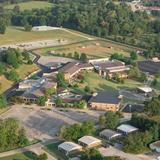- NWACC is a comprehensive, learning-centered two-year college dedicated primarily to meeting the educational needs of its service area. NWACC offers a comprehensive education program including, but without limitation, technical occupational programs, freshman and sophomore programs for students to transfer to four-year colleges, specialty courses, professional continuing education courses, community enrichment classes, and business and industry training to meet the needs of the emerging and existing workforce. Part-time and full-time students are valued equally.
School Highlights
NorthWest Arkansas Community College serves 10,832 students (23% of students are full-time).
The college's student:teacher ratio of 20:1 is higher than the state community college average of 13:1.
Minority enrollment is 37% of the student body (majority Hispanic), which is less than the state average of 39%.
Quick Stats (2025)
- Enrollment: 10,832 students
- In-state tuition: $4,663
- Out-state tuition: $4,738
- Acceptance Rate: 100%
- Student:teacher ratio: 20:1
- Minority enrollment: 37%
- Source: Verified school update
Top Rankings
NorthWest Arkansas Community College ranks among the top 20% of public schools in Arkansas for:
Category
Attribute
Community Size
School Overview
The teacher population of 539 teachers has stayed relatively flat over five years.
NorthWest Arkansas Community College
(AR) Community College Avg.
Carnegie Classification
Associate's Colleges: High Transfer-Mixed Traditional/Nontraditional
Associate's Colleges: Mixed Transfer/Career & Technical-High Traditional
Institution Level
At least 2 but less than 4 years
At least 2 but less than 4 years
Institution Control
Public
Public
Total Faculty
539 staff
162 staff
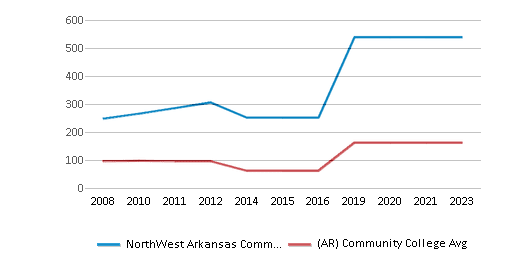
School Calendar
Student Body
The student population of NorthWest Arkansas Community College has grown by 29% over five years.
The student:teacher ratio of 20:1 has increased from 14:1 over five years.
The NorthWest Arkansas Community College diversity score of 0.56 is less than the state average of 0.58. The school's diversity has stayed relatively flat over five years.
Total Enrollment
10,832 students
1,611 students
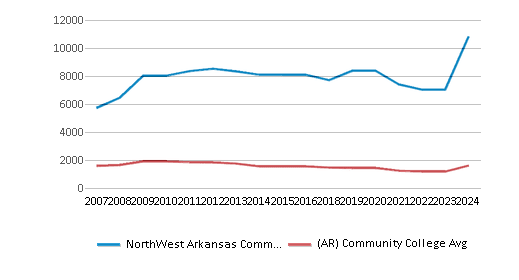
Student : Teacher Ratio
20:1
13:1
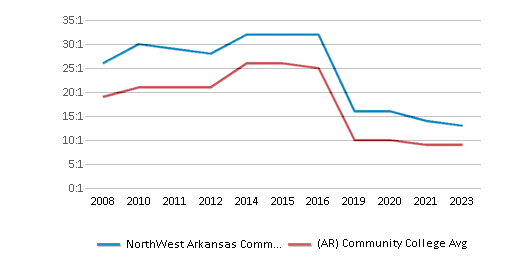
# Full-Time Students
2,467 students
595 students
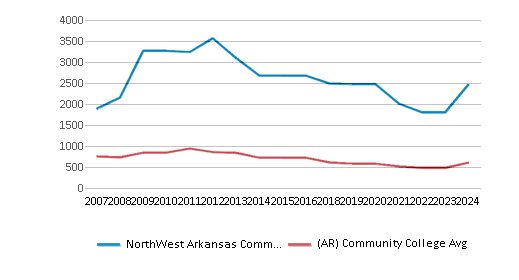
# Part-Time Students
8,365 students
1,058 students
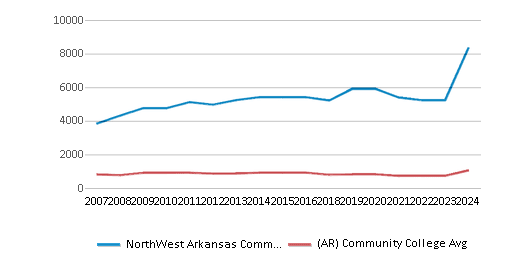
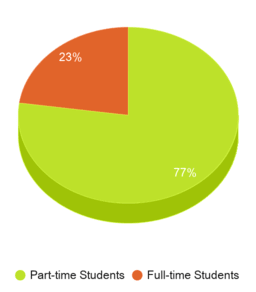
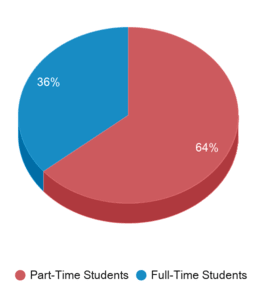
# Enrollment Undergraduate
108 students
217 students
# Full-Time Undergraduate Students
2,467 students
595 students
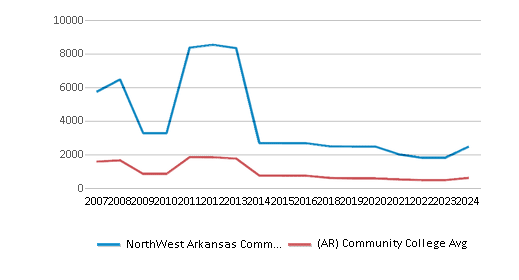
# Full-Time Graduate Students
n/a
15 students
# Part-Time Undergraduate Students
8,365 students
1,058 students
# Part-Time Graduate Students
n/a
38 students
Total Dormitory Capacity
n/a
160 students
% American Indian/Alaskan
1%
1%
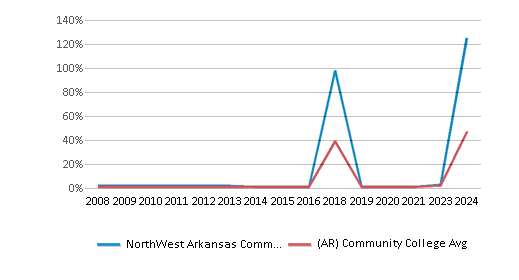
% Asian
3%
2%
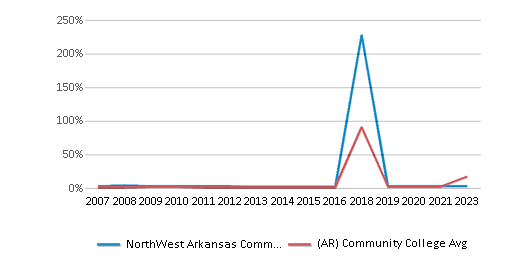
% Hispanic
20%
11%
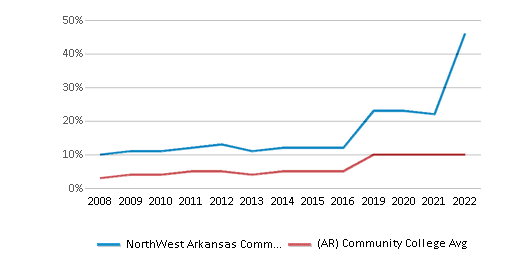
% Black
3%
18%
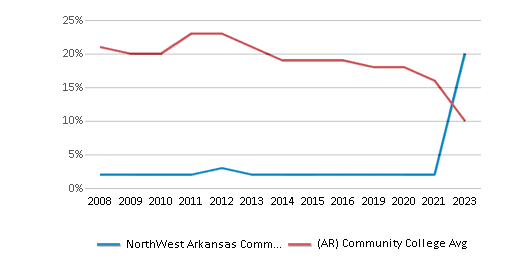
% White
63%
61%
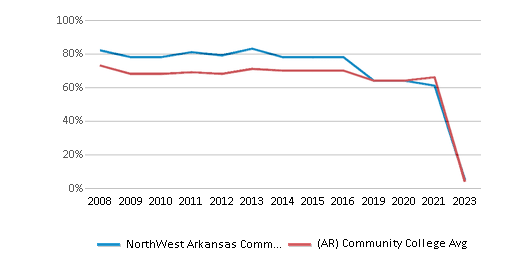
% Hawaiian
1%
1%
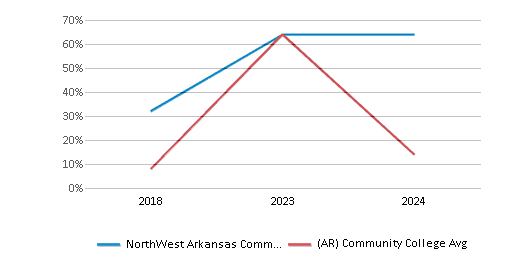
% Two or more races
5%
4%
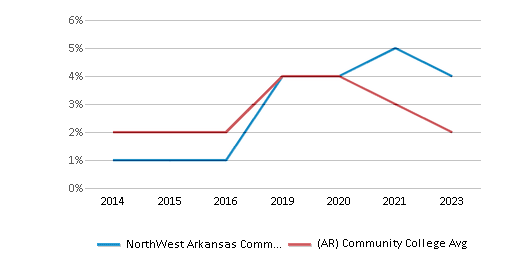
% Non Resident races
1%
1%
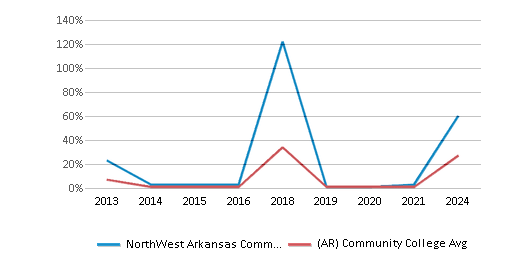
% Unknown races
3%
1%
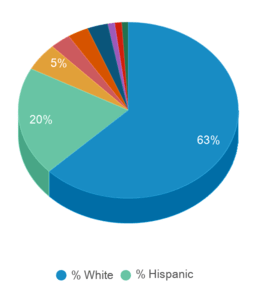
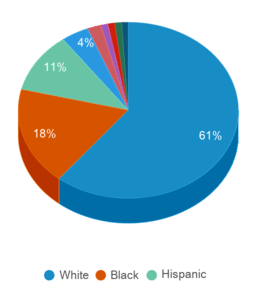
Diversity Score
0.56
0.58
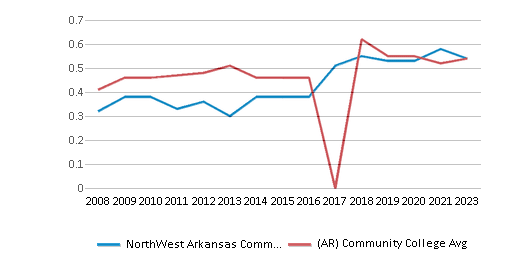
College Completion Rate (Students who graduate in less than 4 years)
0.2488%
0.3818%
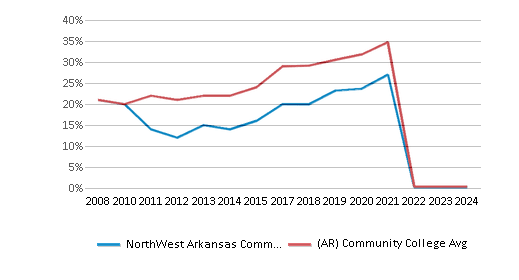
College Completion Rate (Students who graduate in 4 years or more than 4 years)
n/a
0.3095%
Average Graduate Earnings (10 Years)
$37,000
$28,600
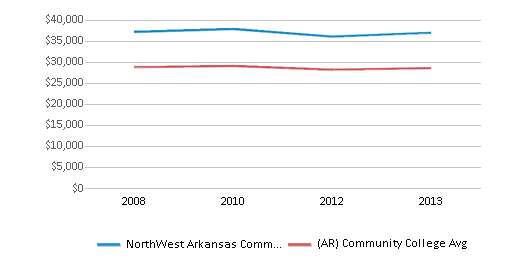
Tuition and Acceptance Rate
The public in-state tuition of $4,663 is more than the state average of $2,994. The in-state tuition has grown by 13% over four years.
The public out-state tuition of $4,738 is less than the state average of $4,750. The out-state tuition has grown by 6% over four years.
In-State Tuition Fees
$4,663
$2,994
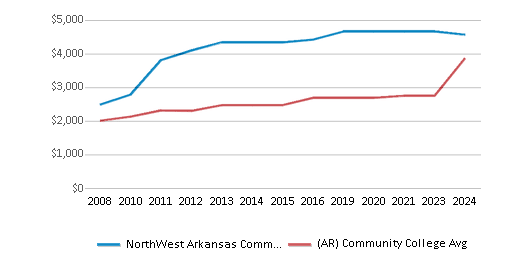
Out-State Tuition Fees
$4,738
$4,750
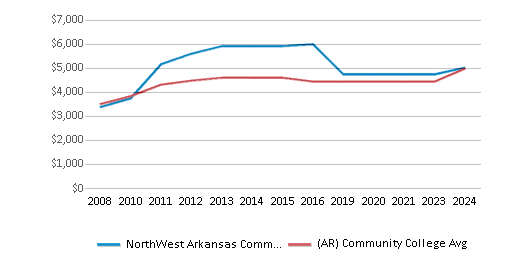
Tuition Notes
Calculated on 30 cre
% Students Receiving Some Financial Aid
66%
94%
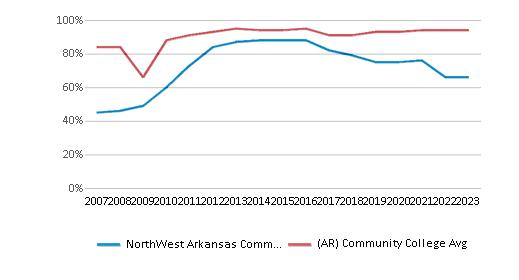
Median Debt for Graduates
$8,750
$9,750
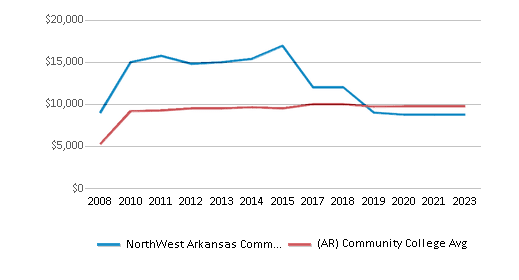
Median Debt for Dropouts
$4,500
$5,300
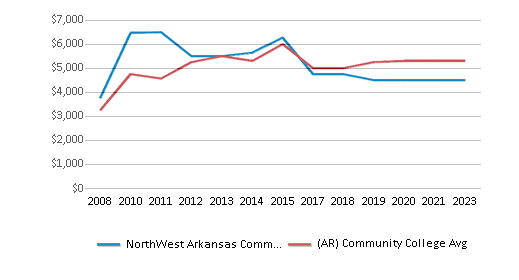
Acceptance Rate
100%
100%
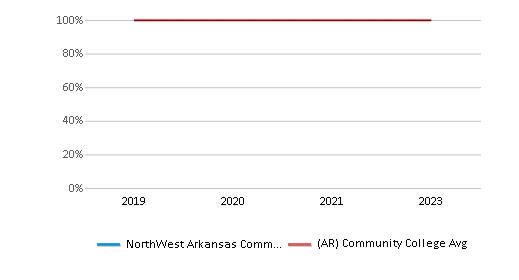
SAT Reading
n/a
540
SAT Math
n/a
520
SAT Writing
n/a
515
ACT Composite
n/a
22
ACT English
n/a
22
ACT Math
n/a
21
Source: 2024 (or latest year available) Integrated Postsecondary Education Data System (IPEDS)
School Notes
- The NorthWest Arkansas Community College District was authorized on August 15, 1989, when voters in the Rogers and Bentonville public school districts passed a 3-mil tax. The first classes were attended by just more than 1,200 students in the fall of 1990 at high schools, chambers of commerce, municipal and leased facilities throughout the district. Burns Hall opened its doors to just more than 2,400 students in August 1995. Northwest Arkansas Community College is now the largest community college in Arkansas serving over 15,000 students annually in credit and non-credit programs. The collegeis accredited by the Higher Learning Commission (HLC) and was most recently granted continued re-accreditation for 10 years by the HLC in 2012.
Frequently Asked Questions
How much does NorthWest Arkansas Community College cost?
NorthWest Arkansas Community College's tuition is approximately $4,663 for In-State students and $4,738 for Out-State students.
What is the acceptance rate of NorthWest Arkansas Community College?
The acceptance rate of NorthWest Arkansas Community College is 100%, which is equal to the state average of 100%.
What is NorthWest Arkansas Community College's ranking?
NorthWest Arkansas Community College ranks among the top 20% of community college in Arkansas for: Largest student body.
Recent Articles
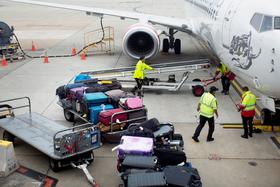
Unlocking Airport Career Opportunities: Your Guide to Ground Jobs
Discover the diverse range of ground jobs at mid-size U.S. airports, their educational requirements, and how community colleges can prepare you for these exciting careers.

Careers: Dental Hygienist, Medical Lab Technician & More Healthcare Positions
Considering the healthcare field? Your community college can equip you for any number of healthcare positions, including Dental Hygienist, Medical Lab Technician, and more.

How To Craft the Perfect College Admissions Essay
Read on to learn the ins and outs of crafting the perfect college application essay.


